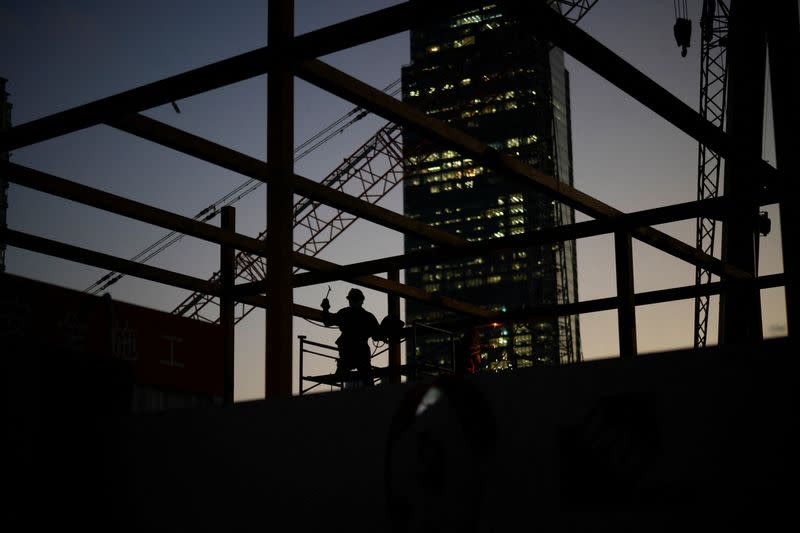It’s two years since China’s private property developers began to collapse amid a government crackdown on their massive debt levels.
Two years and there’s very little light at the end of the tunnel for multiple developers now mired in default.
A shrinking land bank and sluggish property demand are likely to hamper the plans of many developers restructuring after defaulting on their debts, desperate to win breathing space to revive their fortunes.
Those hurdles could hinder the drastic improvements in sales and liquidity the realtors need to resuscitate their business and service debt in the long-term, according to five developers and restructuring advisers.
That could necessitate a second round of debt restructuring eventually at some of the developers, they said.
ALSO SEE:
China Developer Sunac Posts $2 Billion 2022 Core Loss
“Most of the restructuring deals we see for now only buy time for developers. But problems might come back if the developers can’t generate cashflow as they expected,” Esther Liu, analyst with S&P Global Ratings, said.
Private developers have been in turmoil since mid-2021 following a crackdown on debt levels by Beijing that ensnared China Evergrande Group, then the No-2 developer, and eventually spread in the sector. Property companies were among the biggest high-yield issuers in Asia.
The crisis drained developers’ liquidity, resulting in many defaults. Evergrande and Sunac China are the most prominent among the handful of companies that have announced their offshore debt restructuring terms so far.
More are expected to do so in the coming months, which will also include terms such as longer maturity extensions, lower coupons, and converting some debt into equity, developers and advisers said.
The objective is that by freeing up the developers from repayment obligations in the first few years, they are provided enough breathing space to get back on their feet.
Property sales fell sharply in April
The revival, however, seems to be uncertain as both the broader economy and the property sector are stumbling. Property investment and sales fell sharply in April, and the pace of home price gains slowed during the month.
Moreover, the private developers are staring at lower potential future revenues as they are unable to build on their land banks due to their precarious financial positions.
In 2022, 84% of land in 22 major Chinese cities was won by state-owned or state-backed developers in auctions, according to private researcher CREIS. In the first four months this year, they accounted for 14 of the top 20 land buyers.
“The industry will need another restructuring,” said a senior executive of a mid-sized developer that has defaulted on its offshore debt, citing a possible paucity of resources after two to three years of completing existing projects and repaying onshore banks as reasons.
“To become a normal operation again developers will need to buy land, but if there are any proceeds from sales, do you think our creditors would want us to pay them back first or use it to buy land?,” the executive added, declining to be named due to the sensitivity of the issue.
Creditors ‘don’t want haircuts on their loans’
Developers said contributing to a possible rise in second restructurings is the likelihood that their leverage will remain high even after this round of restructuring, because of strong opposition from creditors, especially Chinese banks, to take “haircuts” to reduce the debt principal.
Creditors prefer instead to swap part of the debt into equity in such deals.
However, this means the company’s debt will not be lowered to a meaningful level to run a healthy future business because a firm cannot convert too much debt into equity to a level that alters control of the company.
A higher equity base will also raise the risk of developers falling into negative equity.
“If property price fell, it will negatively impact the developers’ book value of equity, and it might need to do restructuring again,” John Lam, UBS head of China property research, said.
Some companies have recently entered into debt restructurings after they extended repayment maturities last year via bond exchange deals, dashing hopes the raft of supportive policies rolled out in November could help turn around the market.
The latest such case is KWG Group, which was deemed to be of better quality.
Despite all the uncertainties and concerns, developers and creditors said they would like to close the restructuring chapter soon and move on.
“Only by completing a restructuring, we can talk to clients and banks and pretend things are back to normal,” one developer said.
- Reuters with additional editing by Jim Pollard
ALSO SEE:
Rich Chinese Back Buying up Property in SE Asia, Australia
No Cheer for Evergrande’s Long-Awaited Dollar Debt Revamp Plan
China Property Crisis Unchecked Risks Social Instability: BofA
AF TV – Evergrande Debt Crisis: Five More Developers on the Brink of Default
























